Iran Sentences Four To Death For ‘Ties With Mossad’

The Islamic Republic has sentenced four people to death for what the judiciary calls “cooperating with the Israeli intelligence service and committing kidnappings.”

The Islamic Republic has sentenced four people to death for what the judiciary calls “cooperating with the Israeli intelligence service and committing kidnappings.”
Iran’s Mizan News Agency, which is affiliated with the Judiciary, said Wednesday that the four, who had been arrested back in June, have been “destroying private and public property and obtaining fake confessions.”
The Islamic Republic has long accused arch-enemy Israel of carrying out covert operations on its soil. However, it has not provided evidence to prove its claims against those who received the death penalty. Iran’s judiciary never holds such trials transparently and it is not clear if such trials have indeed been held.
Throughout the years, due process has not been implemented during political and security trials while the Islamic Republic often accuses Israel and the West of having spies in the country.
This time the identities of the accused have been announced, alleging that “with guidance from the Israeli intelligence service, this network of thugs” were committing crimes.
Israeli is believed to have been behind assassinations and acts of sabotage against Iran’s nuclear facilities, but no one was ever put on trial for these incidents.
On Wednesday, three other people were handed prison sentences of between five and 10 years for alleged crimes such as acting against national security and possessing illegal weapons.
International community and human rights organizations have repeatedly expressed concerns about Islamic Republic’s detentions, sham trials, and the death sentence for people.
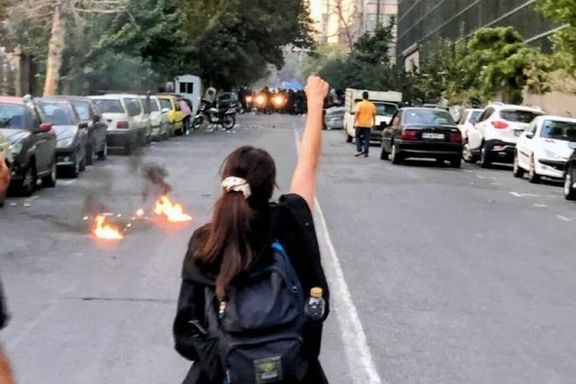
A Revolutionary Court of the Islamic Republic will try ten adolescent protesters Wednesday on charges of “war against God, corruption on earth and murder” that can carry the death sentence.
The move has led to widespread objections as several activists and organizations have expressed deep concern.
A committee monitoring the situation of recent protest detainees said, “these children are not having their own defense teams and lawyers appointed by the judiciary are supposed to represent them.”
A law in Iran forbids those charged with political crimes to hire their own lawyers.
They are charged in the death of a Basij militia member during protests on November 3 in Karaj west of Tehran.
Mohsen Borhani, a lawyer, and professor at Tehran University, had earlier warned about the trial of several detained minors in revolutionary courts.
During the popular uprising in Iran, over 18,000 citizens have been arrested and some of them were accused of “corruption on earth” and “war against God” which may carry the death penalty.
On Tuesday, Amnesty International called on governments with embassies in Iran to send observers to ongoing trials where protesters are at risk of being sentenced to death.
Amnesty said in a tweet this includes a group trial starting November 30 of 11 people, before Branch 1 of Revolutionary Court in Alborz.
“Amnesty is also extremely concerned at reports indicating children are among those at risk of being sentenced to death in mass trials in connection with protests, which would be a flagrant violation of international law,” it added in a statement.
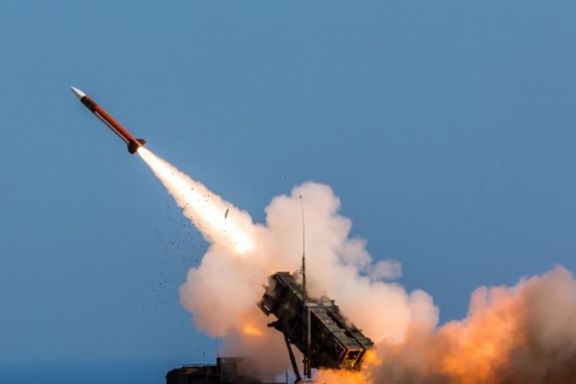
The US State Department has approved the potential sale of an anti-drone system to Qatar in a deal valued at $1 billion, the Pentagon said on Tuesday.
The potential sale approval comes after U.S. President Joe Biden, earlier this year, designated Qatar as a major non-NATO ally of the United States, granting special status to a key friend in a turbulent region.
"Qatar is a good friend and reliable and capable partner. And I'm notifying Congress that I will designate Qatar as a major non-NATO ally to reflect the importance of our relationship. I think it's long overdue," Biden said in January when he met Qatar's emir, Sheikh Tamim bin Hamad al-Thani.
Separately, Qatar has also played a role in the Iran nuclear talks and in relations with Afghanistan, where Washington's interests were represented by the small Gulf country.
The proposed sale will improve Qatar's capability to meet threats by providing electronic and kinetic defeat capabilities against drones, the Pentagon said.
The principal contractors will be Raytheon Technologies Corp RTX.N, SRC and Northrop Grumman Corp NOC.N, the Pentagon said in a statement. It added that the Pentagon's Defense Security Cooperation Agency notified Congress of the possible sale on Tuesday.
It will require the assignment of five additional US government and 15 US contractor representatives to Qatar for five years to support fielding, training and sustainment activities, the statement added.
Despite approval by the State Department, the notification does not indicate that a contract has been signed or that negotiations have concluded.
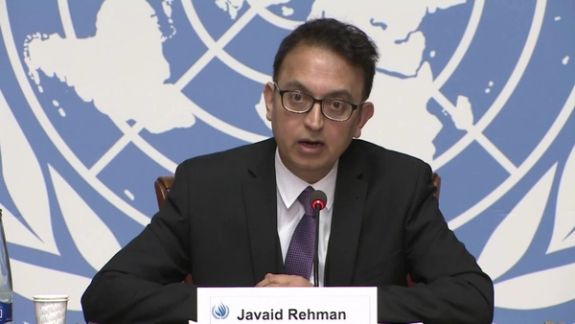
Javaid Rahman, the United Nations Special Rapporteur on human rights in Iran, has said a UN vote had increased the likelihood of “violence and repression.”
Rahman was speaking after the UN Human Rights Council voted November 24, by 25 votes to six with five abstentions, to establish a fact-finding investigation into deadly government violence against protesters.
In an interview with Reuters news agency, the special rapporteur, said he was concerned at a “campaign” of death sentences over recent protests in Iran, which has a high incidence of capital punishment: “I’m afraid that the Iranian regime will react violently to the Human Rights Council resolution and this may trigger more violence and repression on their part.”
According to Norway-based HRANA, November 286, 451 protestors and 60 members of the security forces have been killed in protests since September 17, the day after the killing in custody of Kurdish woman Mahsa Amini. Just over 18,000 people have been arrested. Rahman told Reuters that six of those arrested had this month been sentenced to death.
"Now (authorities) have started a campaign of sentencing (protesters) to death," he added, saying he expected more to be sentenced.
Already, 21 people arrested in the context of the protests face the death penalty, including a woman indicted on "vague and broadly formulated criminal offences", and six have been sentenced this month, Rehman said.
Budget, staff, evidence
The mission set up by the UN vote will have a $3.67 million budget and 15 staff, the news agency reported, but Rahman, who has not been allowed to visit Iran since he was appointed in 2018, did not explain what course of action he intended beyond an aim to “collect, consolidate and analyse evidence.”
Iran this week announced that it will not cooperate with the UN investigation, which means Rehman will continue to be persona non grata.
Rehman said he expected the mission to gather a list of perpetrators to be shared to national and regional legal authorities to “ensure accountability and…provide evidence to the courts and tribunals.”
The special rapporteur therefore appeared to evoke universal justice, under which states or international bodies pursue serious cases – usually crimes against humanity – regardless of where the alleged crime took place.
Universal jurisdiction
In July a court in Sweden sentenced to life imprisonment Hamid Nouri, a former Iranian official, over 1988 prison massacres in Iran, three years after he was arrested after arriving in Stockholm on holiday. In January a German court jailed for life Anwar Raslan, a former Syrian intelligence office earlier granted asylum, for murder and rape of prisoners in Damascus.
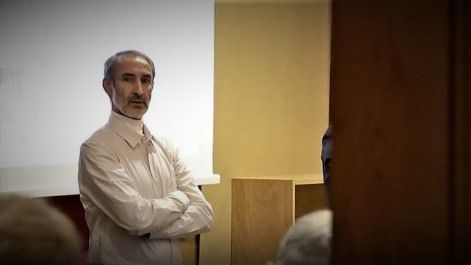
But such successes are rare. Notable failures in universal jurisdiction include Britain’s 1998 arrest under a Spanish warrant of former Chilean dictator Augustine Pinochet and the 2001-3 prosecution in Belgium of former Israeli premier Ariel Sharon over the 1982 massacres in Beirut’s Sabra-Shatila Palestinian camp. The US has generally eschewed universal jurisdiction, refusing to join the International Criminal Court. President Donald Trump in 2019 pardoned three US soldiers implicated in war crimes in Iraq, and President Joe Biden recently granted immunity to Mohammad bin Salman although US intelligence regards the Saudi crown prince as responsible for the 2018 murder of journalist Jamal Khashoggi in Istanbul.
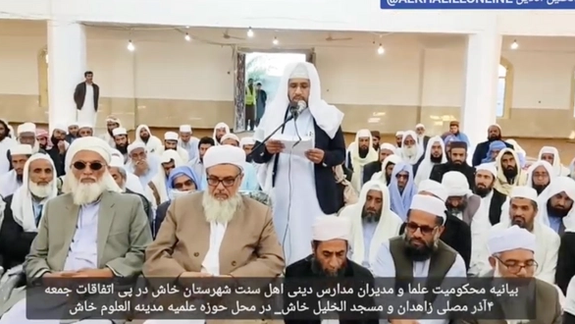
A group of Sunni religious leaders in several Baluch cities across Sistan-Baluchestan province called on the Islamic Republic to stop its repression machinery used against protesters.
In a joint video statement released on Monday, Friday prayer Imams and religious scholars from Khash, Taftan, Mijaveh and their neighboring towns decried the regime’s appalling attacks against the people of Kurdish majority cities, the killings on September 30 dubbed as ‘Bloody Friday’ in Zahedan, and a brutal crackdown of Khash residents on November 4, among others.
Protesting Islamic Republic’s violations of human rights and dignity, they said religious leaders, elders and intellectuals in the province with a unified voice condemn government’s violent reaction to protests across the country and show their “national solidarity.”
The clerics said the attacks against the people at the Grand Makki Mosque -- the largest Sunni mosque in Iran located in the center of Zahedan – and Al-Khalil Mosque in Khash, where security forces arrested many people, and similar incidents across the province are aimed at fomenting fear among the people to dissuade them from attending prayers at mosques. They denounced the strategy by the Islami Republic as “Mosquephobia,” apparently because the mosques are places where Sunni people gather to listen to their community leaders criticize the regime.
The signatories of the statement also called for "the release of all political prisoners in Iran, who were arrested during the recent protests." Noting that peaceful protest is the people's right, they also urged the authorities to address issues regarding women's rights. “The voices of the Iranian people should be heard," they added.
Emphasizing that the relentless ethnic and religious discrimination that has persisted over four decades of the Islamic Republic, the Sunni clerics expressed support for “the wise positions” of Mowlavi Abdolhamid as the serious and legitimate demands of the people.
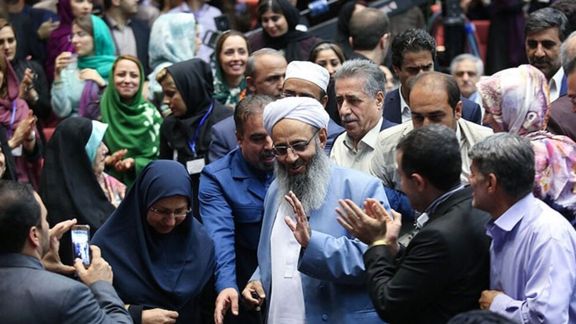
Molavi Abdolhamid, officially known as Sheikh Abdolhamdid Esmailzehi, is the most prominent religious leader of Iran's largely Sunni Baluch population living in the province. Abdolhamid's popularity is largely because of his willingness to challenge the absolute authority of Supreme Leader Ali Khamenei. Earlier in November, the outspoken Sunni Imam said women, ethnic and religious groups, and minorities have faced discrimination after the establishment of the Islamic Republic in 1979. He was also brave enough to blame Khamenei for the attack on protesters in his hometown, Zahedan, known as the Bloody Friday. It took place September 30, when security forces killed about 100 people, and injured hundreds. Earlier in the month, he called for an internationally monitored referendum, saying by killing and suppression the government cannot push back a nation.
The statement by the Sunni clergymen came a day after an audio file was leaked by the hacktivist group Black Reward, revealing the Islamic Republic’s plan to tarnish Abdolhamid’s reputation. The audio tape from a meeting between a Revolutionary Guard general and a group of media managers or representatives from outfits affiliated with the IRGC, revealed that Khamenei demanded Mowlavi Abdolhamid be warned over his comments. Qasem Qoreyshi, the deputy commander of IRGC’s paramilitary Basij forces, also said in the meeting that “We made a mistake about Abdolhamid. We first eliminated tribal leaders in the region to give more credit to Abdolhamid. However, he didn’t carry much weight [in the past].”
In a similar joint video statement released earlier in the month, Sunni religious leaders and Friday prayer Imams in Iran’s Kordestan province also called for a referendum under the supervision of international bodies. The Sunni clerics of Sanandaj and Dehgolan called for a plebiscite with the presence of religious and national leaders, as well as neutral international observers to “get out of the current situation.”
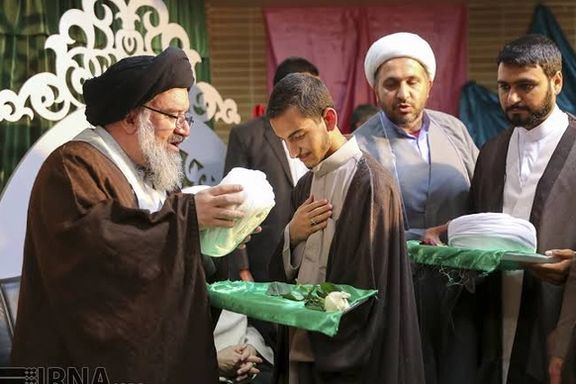
Mohammad Reza Moballeghi, an Iranian lawmaker, says some clerics no longer wear their robe and turban in public fearing disrespectful acts by random individuals.
Clerics in Iran are among the most privileged groups in society and benefit from many financial and other advantages although a majority of them have minimal educational and almost no work expertise. Among other things, they are exempted from the compulsory two-year military service and unlike other students who have to pay hefty tuition fees, clerical students in Iran get paid for studying in seminaries.
As Iran's biggest protests against the Islamic Republic and clerical rule has been raging on for more than 70 days, turban-tossing has become increasingly a way of taking on the clerics who are blamed for economic failures of the theocratic government and violations of human rights in Iran.
Turban-tossing has turned to s port for young people who approach a cleric in the street and fling the turban off his head. Influential clerics with links to the government rarely walk in the streets and are usually escorted by bodyguards.
Moballeghi, himself a cleric, speaking in parliament Monday said that "During the past two months the people's attitude toward clerics has changed for worse as there is a lot of propaganda against clerics."
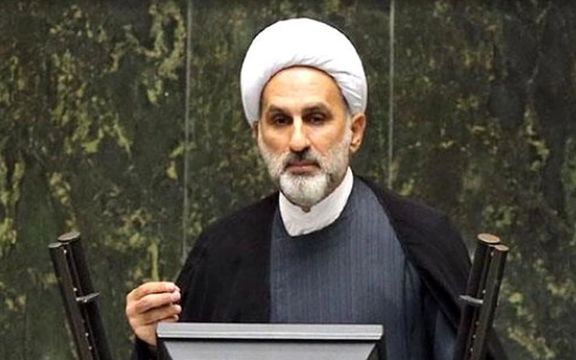
Fearing disrespect by the "new revolutionaries" in Iran, according to Moballeghi, many clerics prefer to appear in public in normal, secular outfit. Meanwhile, Moballegi claimed that the robe and turban that Iranian clerics put on follows the model of the outfit worn by Prophet Mohammad. Others, including some clerics say that the prophet dressed like everybody else. At the time everyone was wearing a robe.
Earlier, another cleric in parliament, Mohammad Taghi Naghdali warned that those who toss turbans “are playing with the lion's tail and they should know that they will be punished for that." Earlier, Judiciary Chief Gholamhossein Mohseni Ejei had warned them that their "rude behavior will not remain unpunished."
He was right, as the government-owned newspaper Iran reported on Monday that at least two young men have been arrested in Tehran and Babol for turban tossing. Some videos on social media show young women also tossing turbans in the streets before running away.
Opposition to Shiite clerics has been a characteristic of what is now called the" new Iranian revolution." One of the main slogans heard in Iranian cities these days is "Mullahs should get lost."
As a result of many years of discrimination by the clerical government, Iranians have been taking on the clerics during recent protests. In a couple of cities including Qom, protesters have set fire to seminaries.
While many young Iranians are unemployed because of the country's chronic economic crisis, almost every Iranian cleric has some sort of a job at various ministries such as education, justice or Culture and Islamic Guidance. Many other government offices and military organizations in Iran have "ideological departments" led and run by clerics who know nothing about how those organizations operate.
During the protests in the past two months very few Iranian clerics have shown any sympathy with the protesters. On the contrary, many, particularly those at the parliament, or Friday Prayer Imams have called for severely punishing protesters.